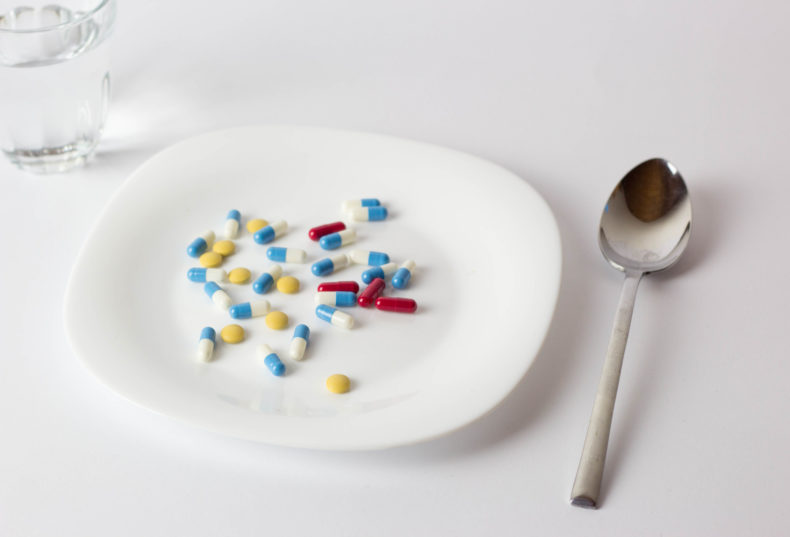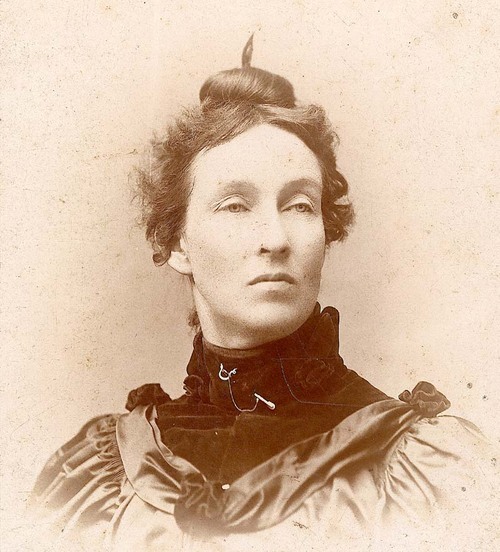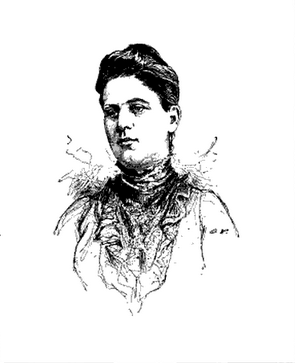
What if instead of eating three meals each day (plus snacks, if you’re me) we just popped pills and moved along with our lives. Food pills were once a staple of science fiction, from Dr. Who to Star Trek to the Jetsons, and I recently did an episode of my podcast Flash Forward about the dream of replacing food with capsules. Turns out, food pills are basically impossible to achieve, but the continued obsession with them says a lot about cultural neuroses.
You can listen to the episode for more about that (please do, this is a bald faced plug for my podcast) but one thing that struck me in researching the episode is the way that the history of food pills as a concept is told online. The woman who is almost always credited with the idea certainly didn’t come up with it, nor did she care about it all that much at all. Her story is far more interesting, in fact, and the fact that her name is now synonymous with food pills rather than her actual work is a fascinating (if depressing) case study in how history is repeated and warped online.
Most current popular tellings of food pill history credit the idea of food pills to Mary Elizabeth Lease, a suffragette who tied synthetic foods to the liberation of women. In 1893, she wrote an essay delightfully called “Improvements So Extraordinary the World Will Shudder,” that outlined her argument in favor of synthetic food:
Science will take, in condensed form from the rich loam of the earth, the life force or germs now found in the heart of the corn, in the kernel of wheat, and in the luscious juices of the fruits. A small phial of this life from the fertile bosom of Mother Earth will furnish men with substance for days. And thus the problems of cooks and cooking will be solved.
The slaughter of animals — the appetite for flesh meat that has left the world reeking with blood and bestialized humanity — will be one of the shuddering horrors of the past. Slaughter houses, butcher shops, and cattle pens will be converted into conservatories and beds of bloom. Mand and beast will hold life sacred. And the vegetarians of the next century will explain with [Oliver] Goldsmith:
No flocks that range the valleys free,
To slaughter I condum;
Taught by that power that pities me,
I learn to pity them.
Lease only dedicates those two graphs to food, in this essay. She has a ton of other shudder-worthy predictions too. “Three hours will constitute a long day’s work” she predicted. “The tendency toward the accumulation of great wealth in the hands of a few will decrease in the next century,” she wrote. “Women shall have the sole right to say when she shall wear the crown of motherhood.” None of those things, as of yet, are true.
Most popular tellings of Mary Elizabeth Lease’s life and contributions to futurism stop there. But let’s go a little further. Lease was born in 1850 to Irish immigrant parents in Pennsylvania. She moved to Kansas in 1870, married a pharmacist, and started causing trouble. Lease was charismatic and emotional. Even her rivals admitted that she could carry a room. “She could recite the multiplication table and set a crowd hooting and hurrahing at her will,” wrote William Allen White, an editor who opposed most of what Lease stood for.
In the 1880’s, Lease and her husband moved to Wichita, Kansas, and Lease started studying law and getting involved in politics. She became one of the first women to pass the Kansas bar, and started organizing for women’s suffrage, and then the labor movement, and ultimately the Populist party. In the 1890’s, the Populist movement gained a whole lot of steam in Kansas and Lease was one of their regular stump speakers. According to Vassar, “She was bitterly assailed in the Republican and Democratic press, accused of being a ‘virago’ and ‘petticoated smut-mill.’”

The most famous quote attributed to Lease during her life, was apparently having told the farmers of Kansas to “raise less corn and more hell.” Lease almost certainly didn’t come up with this phrase — most historians think that Ralph Beaumont did — but Lease says she loved it. She wound up falling out with the Populist cause, angry that they were willing to compromise with Democrats. Eventually she divorced her husband and went to live with her various children until she died.
(It’s also worth noting that, like most white women suffragettes (and many white women today) Lease was almost certainly a racist. In the food pills essay she writes “The ripest years of his white manhood he has been writing justice on the nation’s page.” She also advocated for a U.S. colonization of Latin America. I’ve seen some pieces about Lease that claim she worked for African American suffrage, but they never source that claim and I can’t find any evidence that it’s true.)
The thing is, Lease wasn’t the first person to talk about food pills. She wasn’t even the first woman to propose food pills as liberatory devices for women. even though she often gets the credit for first imagining food pills, the idea predates Lease. In 1887, a woman named Anna Dodd wrote a satirical novel called The Republic of the Future, about New York in 2050. In the book, food tablets are delivered to apartments (kitchenless apartments, of course) via pneumatic tubes. Here’s a bit from the book:
“The food is sent to us by electricity through the culinary conduits. Every thing is blown to us in a few minutes’ time, if it be necessary, if the food is to be eaten hot. If the food be cereals or condensed meats, it is sent by pneumatic express, done up in bottles or in pellets. All such food is carried about in one’s pocket. We take our food as we drink water, wherever we may happen to be, when it’s handy and when we need it. Although,” she added with a sigh, “I sometimes do wish I had lived in the good old times, in the nineteenth century, for instance, when such dear old-fashioned customs were in vogue as having four-hour dinners, and the ladies were taken into dinner by the gentlemen and every one wore full dress—the dress of the period, and they used to flirt—wasn’t that the old word? over their wine and dessert. How changed every thing is now! However,” she quickly added, “if kitchens and cooking and long dinners hadn’t been abolished, the final emancipation of women could never have been accomplished. The perfecting of the woman movement was retarded for hundreds of years, as you know, doubtless, by the slavish desire of women to please their husbands by dressing and cooking to suit them. When the last pie was made into the first pellet, woman’s true freedom began. She could then cast off her subordination both to her husband and to her servants. Women were only free, indeed, when the State prohibited the hiring of servants. Of course, the hiring of servants at all was as degrading to the oppressed class as it was a clog to the progress of their mistresses’ freedom. The only way to raise the race was to put every one on the same level, to make even degrees of servitude impossible.”

Dodd was nearly the opposite of Lease — a conservative, who hated feminists — and this was supposed to be total absurdity. Lease proposed it earnestly. But the proposal is the same.
So why is Lease, a rabble-rousing radical, pinned to food pills and nothing else, while Dodd doesn’t even get a mention or really any cultural memory?
When you look for a history of food pills, Lease is who comes up. It’s hard to trace back the first time this connection was made, and Dodd was erased (she’s mentioned in a handful of academic articles on this) but it seems like most of the repetition of Lease as the originator of food pills start with a 2012 piece on Matt Novak’s column Paleofuture. Novak writes, “This tiny, white vision of the future had its roots in late 19th Century feminism. In the lead up to the 1893 World’s Fair in Chicago, the American Press Association asked writers from a number of fields to promote the event by writing essays on what they thought the world of 1993 might look like. Their work was published in small town newspapers across the country. American suffragette Mary Elizabeth Lease predicted that by 1993, humans would only eat synthetic food, liberating women from the drudgery of the kitchen.”
Since then, this story has been repeated over and over at Popular Mechanics, VICE, Discover Magazine, Slate and more. Elizabeth Weingarten at Slate credits Novak with this information, writing, “Matt Novak, writer of the Paleofuture blog for Smithsonian magazine, recently traced the pill’s origins, finding that the premise—encapsulating a meal’s worth of calories synthetically—harkens back to the 1893 World’s Fair in Chicago. As part of an essay project to promote the fair, suffragette Mary Elizabeth Lease predicted that Americans would be eating synthetic food essences by 1993, freeing women from their kitchen shackles.” Piece after piece now repeats this as fact — that Mary Elizabeth Lease came up with the idea for food pills in 1893 — even though that doesn’t seem to be true.
You might argue that since Dodd’s proposal was meant as satire, she can’t be credited with the idea. But Lease almost certainly read Dodd’s writing, they were political adversaries and contemporaries, and it seems silly to credit Lease with the idea in some kind of vacuum. History of course, is always complicated. This is not to say that Novak didn’t do his research or intentionally misled his audience. I am sure I myself have repeated historical facts like this countless times. What it is, I think, is an interesting window into how history is made, particularly in the age of the internet where blog posts are written based on other blog posts, and trying to check sources can wind up being a seemingly endless rabbit hole of links to other writers who are getting their information from writers even further back.
The result is that today, Lease is most commonly associated with the idea of food pills. But during her life, nobody knew her for that. Lease never wrote about food pills again. She never spoke about them in speeches, as far as I can tell. In fact, most people who read the essay in which she talks about food pills, probably didn’t even notice that part of it. I’m going to guess that Lease didn’t actually care that much about the idea of synthetic food or food pills. It certainly wasn’t in her top ten list of most important things to push for. People at the time knew her as a loud, socialist woman who toured the country demanding political change. I can’t speak to the dead, but I’d put money on the guess that Lease would prefer to be know that way, rather than as the woman who thought of food pills.
The cumulative effect here is that not only are we remember a woman for something she mentioned once, instead of the work that consumed her. But I think it’s also worth thinking about how popular history on the internet proliferates these kinds of stories, and in this case serves to erase a woman’s prickly political work in favor of something a lot more whimsical. Food pills are easier to swallow than a loud, political woman.
“Improvements So Extraordinary the World Will Shudder”…sounds like a Buzzfeed headline.